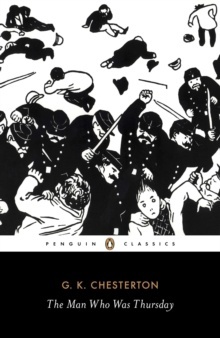The Man Who Was Thursday

Editorial Viking
Colección LONGMAN, Número 0
Fecha de edición febrero 2011 · Edición nº 1
Idioma inglés
EAN 9780141191461
224 páginas
Libro
encuadernado en tapa blanda
Dimensiones 133 mm x 197 mm
Resumen del libro
G.K. Chesterton's The Man Who Was Thursday is a thrilling novel of deception, subterfuge, double-crossing and secret identities, and this Penguin Classics edition is edited with an introduction by Matthew Beaumont. The Central Anarchist Council is a secret society sworn to destroy the world.
The council is governed by seven men, who hide their identities behind the names of the days of the week. Yet one of their number - Thursday - is not the revolutionary he claims to be, but a Scotland Yard detective named Gabriel Syme, sworn to infiltrate the organisation and bring the architects of chaos to justice. But when he discovers another undercover policeman on the Council, Syme begins to question his role in their operations.
And as a desperate chase across Europe begins, his confusion grows, as well as his confidence in his ability to outwit his enemies, unravelling the mysteries of human behaviour and belief in a thrilling contest of wits. But he has still to face the greatest terror that the Council has: a man named Sunday, whose true nature is worse than Syme could ever have imagined ... In his introduction, Matthew Beaumont examines the book's themes of identity and confrontation, and explores its intriguing title.
This edition also contains a chronology, notes and suggested further reading. G.K. Chesterton (1874-1938) attended the Slade School of Art, where he appears to have suffered a nervous breakdown, before turning his hand to journalism.
Biografía del autor
G. K. Chesterton (Londres 1874 - Beaconsfield 1936), fue un literato y polemista inglés convertido en 1922 al catolicismo. Abandonó sus estudios de arte para dedicarse al periodismo. Comenzó escribiendo poesía y ensayos críticos sobre diversos escritores británicos, pero la fama y el reconocimiento internacional le llegaron con sus novelas y relatos, obras llenas de imaginación, sentido del humor y hábil manejo lingüístico, como El hombre que fue Jueves, El Napoleón de Notting Hill, La esfera y la cruz o los celebérrimos relatos del padre Brown. Escribió, además, dos extraordinarias biografías de santo Tomás de Aquino y san Francisco de Asís, esta última publicada en castellano por Ediciones Encuentro.








